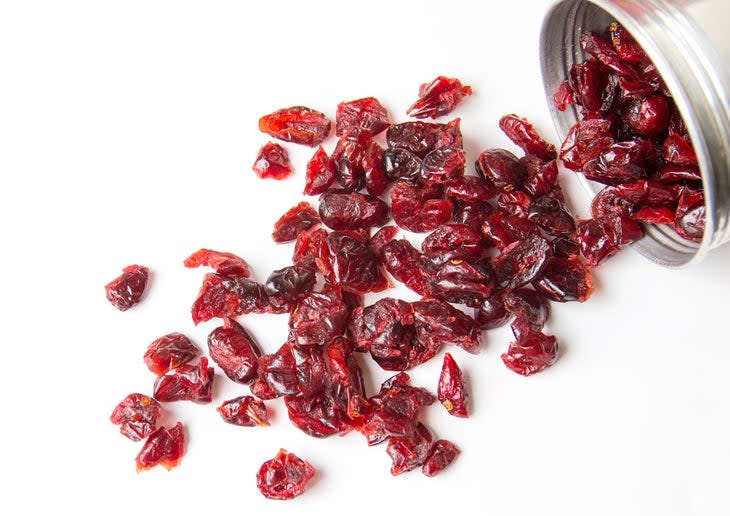You Should Be Putting Cranberries on Everything! Here’s Why.
Cranberry extracts and juices have been proven to reduce urinary tract infections among thousands of people, and the American Urological Association recommends them as the first step in reducing recurring UTIs. But the bright red berry offers even more.
"The bioactives in cranberry juice, dried cranberries, and a variety of other cranberry sources have been shown to promote an array of beneficial health effects," says Jeffrey Blumberg, PhD, of the Jean Mayer USDA Human Nutrition Research Center on Aging at Tufts University in Boston. "I believe we've only scratched the surface when it comes to identifying the potential power of the cranberry."
Studies have found that cranberry juice can reduce risk for heart disease, stroke, and diabetes; eradicate harmful gut bugs; enhance the health of teeth and gums; help protect against cancer; and reduce antibiotic overuse and resistance.
Did You Know?
Cranberries, blueberries, and Concord grapes are among the few cultivated fruits native to North America. Cranberries were used by Native Americans as early as 1550 as a food, medicine, and fabric dye.
What are the health benefits of cranberries?
1. Reducing Risk for Heart Disease, Stroke, and Diabetes
These diseases share underlying risk factors: unhealthy levels of blood pressure, blood sugar, harmful cholesterol, triglycerides, and C-reactive protein, a marker of inflammation. Researchers at the United States Department of Agriculture tested the effects of a low-calorie cranberry juice and found that it improved all these markers.
In a group of 56 men and women with an average age of 50, half drank an 8-ounce glass of cranberry juice twice daily, and the other half drank a placebo beverage. After 8 weeks, all the health markers improved in those drinking cranberry juice. Other studies have found similar results.
2. Eradicating Harmful Gut Bugs
Cell and animal studies show that cranberry prevents harmful bacteria from attaching to the walls of the stomach and intestines, reducing the odds of infection and making it easier for the bugs to be eliminated. Human studies have found that cranberry juice can help to reduce or eliminate infection with H. pylori, which can lead to peptic ulcers, gastritis, or stomach inflammation.
3. Protecting Teeth and Gums
Cranberry prevents harmful bacteria in the mouth from sticking to teeth and gums. Researchers in India formulated a special cranberry mouthwash for use in a study and found that it was as effective in fighting bacteria as a strong antibacterial mouthwash. But so far, this type of cranberry mouthwash has not been developed as a consumer product, and rinsing your mouth with cranberry juice isn't recommended because its acidity can damage tooth enamel.
4. Preventing Cancer
Cell and animal studies have found that cranberry extracts and powders reduce inflammation and can help to prevent or reduce growth of various types of cancers, including cancers of the breast, cervix, ovary, colon, esophagus, prostate, brain, liver, lung, mouth, rectum, and stomach, as well as leukemia, lymphoma, and melanoma.
5. Reducing UTIs and Antibiotic Resistance
It's estimated that at least 40 percent of women and 12 percent of men will experience a UTI at least once in their lives. When antibiotics are routinely used to treat these infection, antibiotic resistance becomes a very real danger. Currently, at least 2 million Americans are infected with antibiotic-resistant bacteria, which means that even minor infections can lead to complications.
Using cranberry extracts or juices to prevent and treat UTIs can help to reduce antibiotic resistance. Angelo Luis, PhD, one of a group of researchers who reviewed cranberry research covering nearly 5,000 people, puts it this way: "Our investigation supports that cranberry products can be a powerful tool to fight off frequent UTIs."
The Special Cranberry Quality

Berries and other fruits are important sources of PACS (short for proanthocyanidins), a class of antioxidants that are especially beneficial. PACs come in different forms: A-type and B-type. Most berries and fruits contain the B-type, but cranberries are rich in A-type PACs, which prevent harmful bacteria from sticking to urinary tract walls, the intestinal lining, and teeth and gums.
How to Benefit from Cranberries
Cranberry extracts: To prevent or treat UTIs, take an extract in tablets or capsules; dosages vary for different extracts.
Cranberry juice: Studies have typically tested 1-2 glasses per day of a juice. To avoid sugar overload, look for a juice sweetened with natural, sugar-free sweeteners, or an unsweetened juice if you like the tart flavor.
Fresh, dried, or freeze-dried cranberries: All contain beneficial antioxidants and are a healthy addition to any diet.
Here are some great recipes that highlight this superfood:

